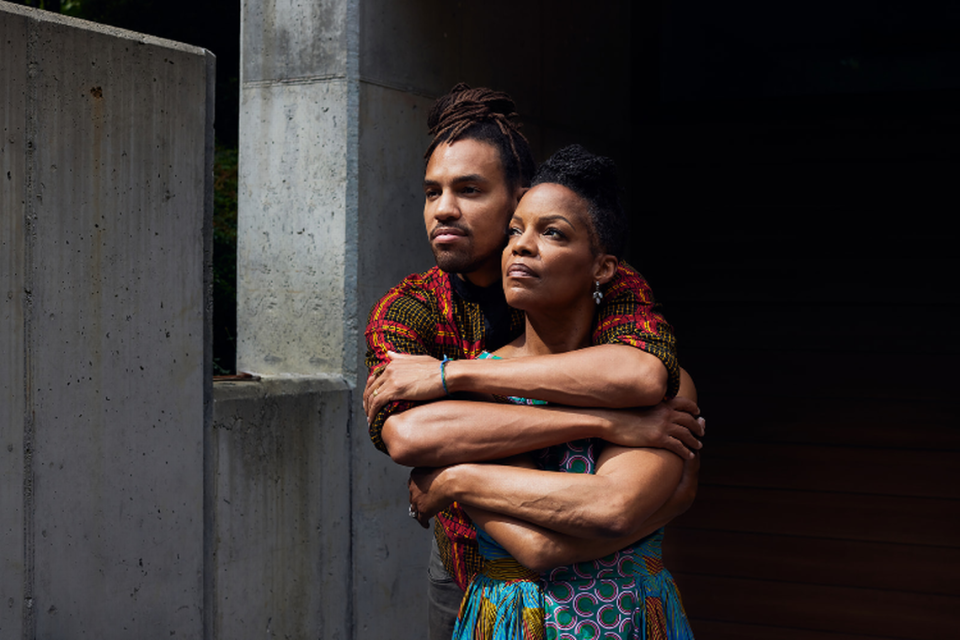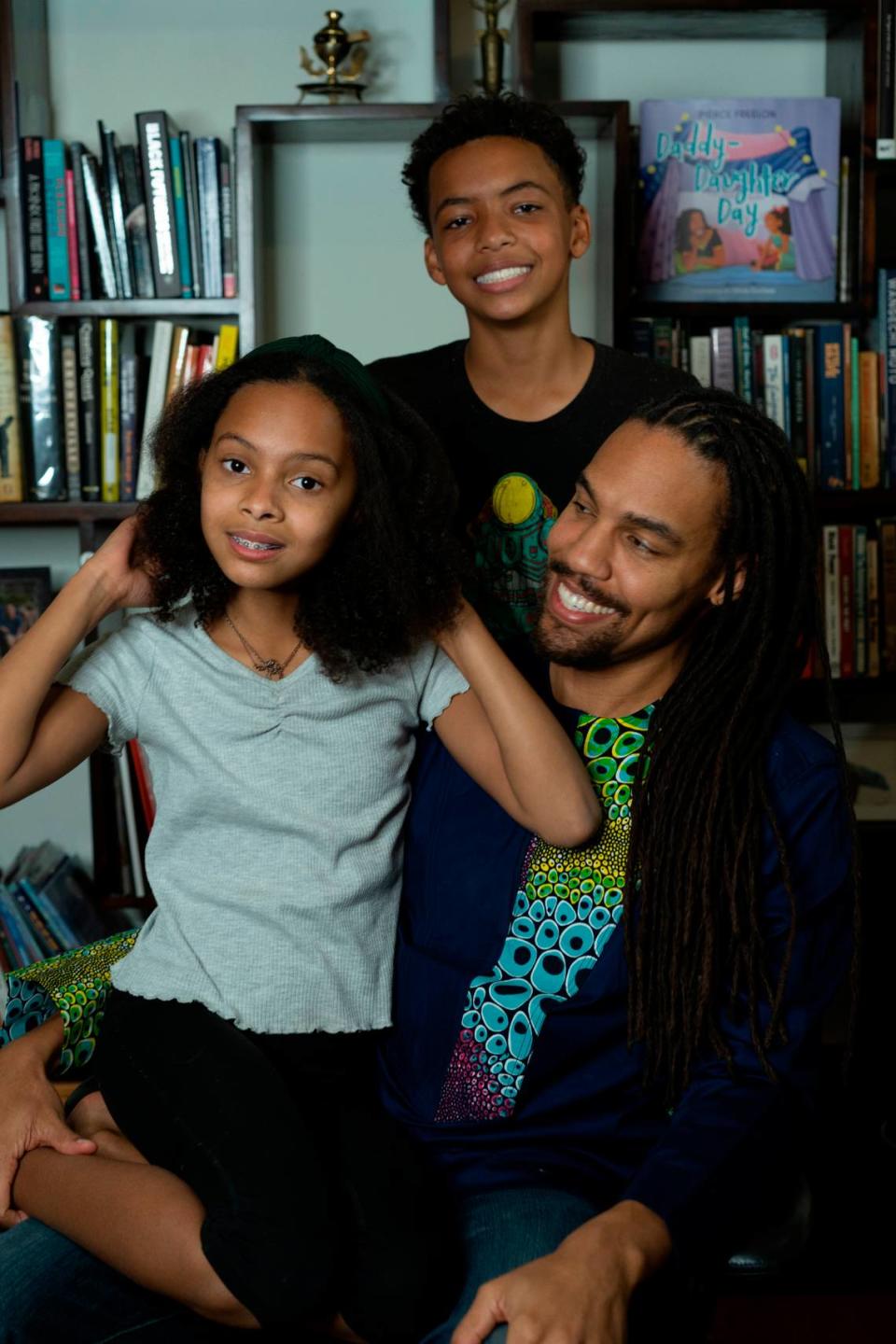Pierce Freelon inspired by family and his Durham community as he merges art with activism
Pierce Freelon grew up surrounded by creative Black people in Durham — people who used their voices to make change — and their influence has helped him become the artist he is today.
His life’s work as a musician, educator and former Durham City Council member is built on the intersection of arts and public service.
“Durham is a really special place,” said Freelon, 38, who recently completed his term on the council.
“I grew up in a creative family, but Durham was just full of creative potential and energy that consumed me,” he said. “I grew up going to church and being around incredible Black folks that had a lot of pride, history and legacy. And so I think in terms of my occupation, I’ve always wanted to merge my art with activism.”
He could turn to his parents as examples to accomplish his mission. He’s the youngest son of Nnenna Freelon, a Grammy-nominated jazz vocalist, and Phil Freelon, the late acclaimed architect known for designing the National Museum of African American History and Culture.
Pierce ran unsuccessfully for mayor of Durham in 2017 and State Senate in 2020. But he when he was appointed in 2020 to fill the vacant Ward 3 Durham City Council seat, he was able to push for action on issues important to him, including finding solutions to gun violence. He did not run in 2021 to keep his seat.
Pierce aims to inspire others through education and by connecting with them through his various projects.
His most recent high-profile project is his critically acclaimed children’s album, “Black to the Future,” which earned a 2021 Grammy Award nomination in the Best Children’s Album category. He also contributed a song on the Grammy-nominated album, “All One Tribe.’’
Not only was his first Grammy nomination special on its own, but his mother also was nominated in a different category for “Time Traveler” in the Best Jazz Vocal Album category.
When he received the nomination, he told The News & Observer in November that it was “redemptive.” He had been disappointed in 2020 when his debut album, “D.a.D,” was passed over for a nomination but was even more frustrated that none of the children’s album nominees were artists of color. Along with other artists of color, he has pushed for greater representation and diversity among nominees, resulting in five artists of color nominated in 2021.
The Grammys broadcast was scheduled to be held in Los Angeles on Jan. 31 but was postponed to April 3, due to the COVID-19 surge.
For his artistic work and passion for creating change, along with his push for greater diversity in the arts and public service, he is The News & Observer’s Tar Heel of the Month, which honors people who have made significant contributions to North Carolina and the region.

Kennedy Center honors
His accomplishments were recently recognized by the Kennedy Center, who named Freelon as one of 50 leaders across the country “sustaining excellence of artistic, educational, athletic or multi-disciplinary work, that is lighting the way forward.”
“The Kennedy Center is an incredibly important cultural institution,,” Freelon said. “But to just be associated with that legacy of excellence in the arts and with the public service piece of it, just really hits home for me as someone who’s an artist and who’s just stepped off of city council.”
Besides recording music, he’s the founder of Blackspace, a digital maker space, where he mentors youth and teaches digital storytelling in Durham.
He travels the world teaching hip-hop and music production to youth, winning an Emmy Award for the PBS web series called, “The Beat Making Lab.” He was the writer, composer and co-director of the animated series, “History of White People in America,” an official selection of the Tribeca Film Festival in 2018.
He also has taught in the departments of music and African, African American and Diaspora Studies at the University of North Carolina at Chapel Hill. His debut children’s book, “Daddy Daughter Day,” based on his song of the same title, is expected to be released on Father’s Day.
He spoke to The N&O about leadership and his achievements. This interview has been edited and condensed for clarity.
What did you want to be when you grew up?
“I’ve always wanted to be a father. Not just any father, but a ‘cool dad.’ Thankfully, my dream came true.”
How do you see your role in your community?
“I use my work as an opportunity to apprentice the youth in Durham. I’m always looking for ways to involve kids that I mentor in the work that I am doing. So instead of engineering the project myself, or going to a studio, a professional studio in engineering, what I did was I brought in some students to run the session. And now they’re learning to engineer, or record artists, mix vocals and range tracks.
“I’ve had Blackspace students do voiceovers, produce beats, record artists — just involve them any way that I can include them into my work. And now guess what? They received an IMDb credit or they got paid because there’s some business structure around it.”
What is the achievement you’re most proud of?
“There’s more to offer kids in children’s music, you know? But there has to be a paradigm shift in our genre towards celebrating more diverse voices. Like we deserve children’s music with dope beats, catchy hooks, with Black culture front and center that’s age appropriate. It’s important just to see yourself reflected in the musicians that you listen to.
“So winning the Grammy nomination felt like another landmark. I am very humbled and grateful that we got the nominees that we got this year and to be among them. I felt heard and seen as as a musician, as a father, as a creative and a songwriter.”

What does leadership mean to you?
“Leadership means helping those who are coming up after me. The opportunity to balance mentoring and music producing is great because I get to work with some young talent and expose them to the world of digital media and production.”
Who is your role model or inspiration?
“One of my early mentors was a dancer and the founder of the African American dance ensemble, Baba Chuck Davis. He passed away a couple years ago (in 2017). But he grew up here in the Triangle, and his dance company came to my school when I was in elementary school.
“I just remember seeing this African man in this huge dashiki just floating around the stage, speaking Swahili and it just really captivated my imagination. He showed me what it was like to be different, but still respected around the world and called Durham, his home.
“But there are nutrient-dense legacies like, Andre Leon Talley, Pauli Murray and Ernie Barnes, who grew out of this community. And even if they have left, they would always come back to harvest in this robust community. And that’s kind of the world that I grew up in.
“I also think my journey and my path as a community member, as an artist and as a father, was really informed by the village that raised me. That included mentors, loved ones in and around Durham, and my parents.”

What is a turning point in your life that helped define where you are today?
“Auntie Maya (Angelou), who was close to my mom and was a godparent, lived in Winston(-Salem). She was obviously a titan in the world of poetry, and I think its really cool that an outstanding piece of her legacy was just immortalized on U.S. currency.
“But one of the last times I got to see her, she shared with me this poem that she wrote called ‘A Pledge to Rescue Our Youth.’ I basically asked her, ‘What torch do we need to carry from your generation that was like unfinished business?’
“And she read me this poem. She says, ‘Clean and well-furnished schools, safe and non-threatening streets and employment, which makes use of your talents, but does not degrade your dignity.’ I started thinking about what I can do to show up in this moment of need — especially with white supremacy on the rise again.
“So, when I decided to run for office, I needed look no further than my last conversation with Auntie Maya to find out what my platform was supposed to be about. Those words would not only influence my political platform, but they influenced where I needed to focus my efforts in service.”

Get to know Pierce Freelon
Family: Pierce currently lives in Durham with his wife, Kathryn, and their two young children, Justice and Stella.
What was the last book you read? “‘The Three Body Problem,’ an awesome trilogy of science-fiction novels by Chinese author Cixin Liu. A powerfully deep dive into history, physics, humanity and futurism.”
Favorite song or musical artist? “I love too many songs to name a favorite but I’ll tell you what I’m listening to right now: ‘Saria’s Song’ (from ‘The Legend of Zelda: Ocarina of Time’) by the 8-Bit Big Band. This is an incredible big band jazz arrangement of a video game soundtrack that I played relentlessly growing up.”
Which famous person, living or dead, would you invite to dinner and why? “I would invite the late, great science-fiction author Octavia Butler to dinner and ask her what happens to the character Lauren Olamina in her unfinished ‘Parable’ book series.”
Favorite quote: “‘No is a love word.’ My grandmother Queen Mother Frances Pierce used to say it all the time and it reminds me to maintain healthy boundaries and protect my peace!”
What do you remember most about your childhood? “I remember exploring nature with my sister and Dad. I loved going on expeditions at the Eno (River), peeking under logs, observing bugs and sitting on mossy boulders.”
What were you like in high school? “In high school, I was growing and glowing. And I still have a lot more of both in my future.”
A perfect day: “A perfect day is simple. A good laugh. Sunlight refracted through a glass of water, dancing. Basking in loving vibrations.”

 Yahoo Movies
Yahoo Movies 